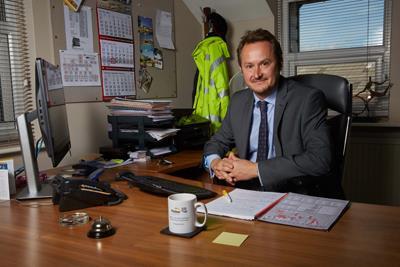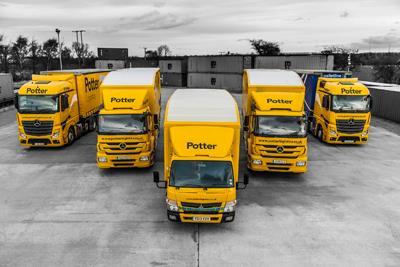Potter Logistics picked up the Haulier of the Year Award in the 2015 Motor Transport Awards - the same year it celebrated its 50th anniversary.Naming Potter Haulier of the Year, the judges said it was a family business with a customer-centric ethos that had secured some very loyal, long-standing clients.
The firm is still owned by executive chairman Derrick Potter (pictured) – who knows almost all of his 300 employees by name - and his family, but his four daughters have no involvement in the day-to-day running of the business. That is handled by a management board of logistics professionals led by MD Matthew Lamb.
“We have a quite distinct structure,” says Potter. “We have the shareholders, we have the operating board, and then we have an advisory board in the middle that helps make the decisions for the long-term. Are we different? I blooming hope so.”
Lamb adds: “We're family-owned and that's very important to us and some of our customers. We're on the radar in terms of scale and size, but we have that closeness to the ownership of the business and the customers that we're looking after.
“Even though the management team is not family, there's a very clear link between the family's wishes and looking after customers. It's not atypical of the transport industry, over the last 50 years but it's clearly changing now. When we go to the Transport Association meetings, some of the owners are struggling to get the next generation to say, ‘we're going to carry on doing this’."
Potter is also a great believer in collaboration with other like-minded family hauliers.
“Before all the problems with the Channel Tunnel, we used to bring 200,000 tonnes to our rail terminal at Ely,” he says. “Different products from across Europe. We would use UK haulers to distribute them.
“That is the way that we operate as a business. We used to take lorries up to Scotland, we used to take lorries all over. Now we work with partners in other parts of the country. There are a lot of family businesses that are particularly good at knowing their own area, and their own customer base.”
Road and rail freight operator Potter Logistics was named Haulier of the Year in 2015 by a judging panel that was impressed by its “strong financial performance” and “good control over all aspects of its business”.
The company increased turnover by nearly £2m to £25m in 2013/14, with pre-tax profit up from £600,000 to £1.7m. Although profits dipped to a low of £400,000 in 2008 after the loss of a major customer in the paper sector, the business has never made a loss.

Lamb (pictured left) puts this success down to serving customers well. “We do have a good reputation, I believe, of meeting customers' needs,” he says. “We like to create long-term partnerships, some of which go back to the very beginning. We have other relationships that exceed 30 years.”
Based at a former MoD site in Ripon, north Yorkshire, where it has 400,000sq ft of warehousing, Potter specialises in storage and distribution of agricultural products, ambient foodstuffs and chemicals. It also acquired House of James in 2012, bringing a second site in York and membership of Palletline covering an area from York to Goole and Scarborough.
It has two 70 to 80 acre rail-connected sites at Selby and Ely which Potter acquired from British Sugar in the early 1980s.
“They are our two largest sites,” says Lamb. “We've got 600,000sq ft at Selby and Ely is a similar sort of facility. We've just secured planning permission for a new client there to create a straw pelletisation plant that will be feeding straw converted into pellets into a new power station in Norwich.”
Its site in Droitwich is also a former MoD site and like Ripon is top-tier Comah registered for storing and handling chemicals. As well as working direct for large multinational chemical manufacturers Potter handles UK distribution on behalf of a number continental logistics operators without a presence on this side of the Channel.
Last year Potter handed over its 160,000sq ft rail-connected site in Knowsley, Merseyside to SITA UK for a new waste transfer station. From there 400,000 tonnes of waste a year will go by train right across the country to a new energy from waste plant on Teeside.
“As a result of that, we picked up all of our pharmaceutical business from the rail freight terminal and moved it to a new facility in Knowsley for our north western pharma clients,” says Lamb.
Steady markets
He says that the regulatory hurdles that have to be overcome to handle chemicals and pharmaceuticals make them steady markets.
“It's fair to say that, once you're doing one type of thing, and you've established credibility in that marketplace, it makes it easier to do more of,” he says. “It's quite difficult, so the barriers to entry are higher.
“We handle packaged chemicals. We don't run tankers. The largest amount of fluid that we handle is a 1-tonne IBC. The only area we do temperature-controlled is pharma. They may not necessarily be the highest margin or fastest growing sectors. They have their own problems, but we're going to stick to our knitting.”
Ely and Ripon have bulk storage facilities for wheat, an echo of Potter’s early days as a grain trader and haulier.

The Selby site includes 600,000sq ft of warehousing and is one of Potter’s more complex operations. It features the UK’s largest rail head for container trains, having been recently extended to 750m so it can accommodate an 87 TEU train. It receives a daily train run by GB Railfreight from Felixstowe, which has to be unloaded and reloaded with export and empty containers within four hours.
“Longer trains make more economic sense,” says Lamb. “This train is very competitive on cost and it is cheaper to hold containers here than in Felixstowe.”
The container park alongside the rail shunt can hold in excess of 1200 TEU. The investment in what looks like a simple container stacking operation has been considerable – the handling pad had to be extra strong to cope with the giant container stacker trucks’ tyre loading and cost £2m, while the three stackers cost £250,000 each.
Selby also received a train carry stone two or three times a week. Aggregates are stored and used to make Tarmac on site which is then collected in road vehicles.
The two surviving former British Sugar brick buildings are now food grade warehouses and used to store rice in bulk. Potter transports it in bulk to a nearby factory for polishing and bagging.
Value added
Selby is also home to one of the company’s value added operations. It operates a 160,000sq ft warehouse with 21,000 pallet spaces for a nearby Greencore food factory. Here Potter “twins” 3m packs of cook-in sauces each year, making up mixed cases of different sauces so small store operators like Lidl and Aldi discounters do not need to take a full case of one flavour.
“Instead of having one SKU within a shelf-space, we mix it up to get two SKUs,” says Lamb. For Aldi and Lidl, it is another way of helping them keep the footprint of their stores quite small, but still having a diverse range on the shelf. It's worked very well for our client.”
On the transport side, Potter took the decision to expand its fleet in 2011 to increase its capabilities.
“Potter has always operated its own fleet, but in 2010 we started to debate whether we could successfully tender for certain types of operation, based on the fleet size we were operating then,” says Lamb. “We wanted to grow the significance of our transport footprint. Most importantly, we felt we needed to be in a pallet network and the best is Palletline.
“It's a co-operative, it's member-owned and it's similar to Potter in the sense that if you look at most of the hauliers in Palletline, they're all family businesses. That led us to securing the acquisition of House of James in 2012.”
Following the acquisition, the company changed its name from Potter Group to Potter Logistics, taking the opportunity to introduce an updated livery – still in the distinctive yellow – in 2013.
Potter has invested £2m in the former House of James site, adding a trailer park, three canopies to unload its eight doubledeck trailers under cover, low energy lighting and new doors; it recently achieved BRC accreditation for its high food hygiene standards. Potter has also recently added two new 26-tonne curtainsiders to the 15-strong rigid fleet used for Palletline collections and deliveries.
Probably the best
John Myers, the York DC manager, came over to Potter with the House of James operation. He is enthusiastic about the Potter ethos and approach.
“Potter Logistics is probably the best - and I've worked for a number of companies,” Myers says. “They’re reliable and honest - it's been brilliant. The communication, the feedback we get, we had nothing like that before.
“It’s a very, very good company. It's been a breath of fresh air in the past three or four years.”
Across the group, the company also operates about 50 tractors and 125 trailers, including linehaul trunking to and from the Palletline hub. “Transport is now about a third of our overall turnover,” says Lamb. “It's more profitable as well.”
Potter buys only Mercedes-Benz trucks, doing most its own repairs and maintenance at a workshop near York, and mainly uses SDC trailers.
Potter is a net inputter into Palletline, with one of its biggest products being turf and may be affected by the impending ban on tail lift deliveries over 750kg.
“Two of our biggest Palletline operations are in the turf sector as the Vale of York is the best area for growing turf in the country,” he says. “You don't warehouse turf. You just collect it out of the field and get it delivered. The pallet network is key for that.
“The growers have invested in methods of rolling the turf to squeeze out moisture. It is also refrigerated to increase the lifespan of the turf so there is now potentially a three-day lifespan in a pallet of turf. We try to pick it up day one for delivery day two.
“We can still forklift pallets over 750kg so if it’s going to a garden centre, it's not a problem. We have worked with that customer so all they need to do is make sure we've got the correct number of rolls of turf on a pallet. They're not happy, but they're working with us on that.”
Pull together
With the House of James acquisition under his belt, Lamb says he has no plans to grow the transport operation further.
“We now operate 65 trucks between artics and the collection and delivery fleet,” he says. “I have no ambition of growing the fleet much more than that. The point of our being a regional and a national operator is that we know we need to pull together.
“There is enough business for everybody, for us to work collaboratively with our Palletline partners and with our Transport Association colleagues.”
Instead, the focus will be on growing its warehousing capacity, both for its own operations and as a landlord to other operators.
It is planning to expand its Ripon site and has received planning consent for 180,000sq ft of commercial property that will be leased out as well as an additional 40,000sq ft for one its logistics clients.
“We're prepared to invest in property from both the logistics side and the commercial property side,” says Lamb. “We're looking to do something similar with each of our locations.”
Potter owns around 300 acres of land across its six UK sites and has a number of options to buy more land. “Our intention is to grow the property side,” says Lamb. “We're utilising our existing logistics assets at high levels at the moment, because there isn't a lot of capacity in the market.”
Nick Brightey, Potter’s transport director, is responsible for maximising the efficiency of Potter’s entire fleet. He has been with the business for 15 years, starting out as a transport manager at Selby, looking after three trucks. He has restructured the operation and centralised it at York to ensure utilisation of the fleet is as high as possible.
“We had a transport department in Selby and a transport department in House of James,” he says. We've gone for a big restructure and it has all migrated back to York.”
Potter employs 67 drivers and Brightey says he has no trouble recruiting and retaining them.
“We are quite fortunate,” he says. “We aren’t competing with lots of other logistics operators as we are a little bit more out in the sticks to some degree. People don't necessarily want to travel from York all the way to Leeds.
“We've invested in getting a few of the younger guys from Class 2 to Class 1. They've repaid that by staying with us.”
The Potter philosophy
Derrick Potter is a farmer’s son, the middle of three boys, and started his transport business in 1965, the same year he got married. “There was not enough land for three of us so I went and worked in Leeds,” he recalls. “I was buying and selling grain, and there was a shortage of transport. So I got my first lorry, a Bedford TK and that is how this business started, with capital investment of £1,945. Each of my brothers put in £500 pounds apiece, and my father gave us the balance.”
For the past 50 years Potter has lived by some good advice his father gave him in those early days.
“He always used to say to me, ‘it's your responsibility to look after your employees’. He always believed in that. He would say, ’if you want something from somebody, give them something. You might give them your time, your expertise, might even give them some money. Then you have a right to ask for something back.’
“In the transport market that we're in, we've had very difficult times, but every year we've managed to give a pay increase. It might only have been small but we share what we have.
“I always remember to say please, to say thank you, to say well done, and hopefully with a smile. They cost nothing, but they mean everything.”
Getting children into logistics
Another of Derrick Potter’s passions is Business on the Move, a board game similar to Monopoly that requires players to develop a logistics system to move goods from China to the UK in the most efficient and environmentally way.

“This game was invented by two school teachers, and I managed to persuade a lot of other people to invest in it,” he says. “You have to excite children, to engage with them. We have to get them interested and grab their attention.
“When they did a survey of 600 schools, 86% wanted a board game, they didn't want a tablet. Why? Because people have to talk and engage with each other.
“I saw it would be an advantage, in the areas where we operate, if we could introduce this into the schools to encourage people to think of logistics. It's absolutely fundamentally important. We should be challenging the next generation and we should be supporting them.”














